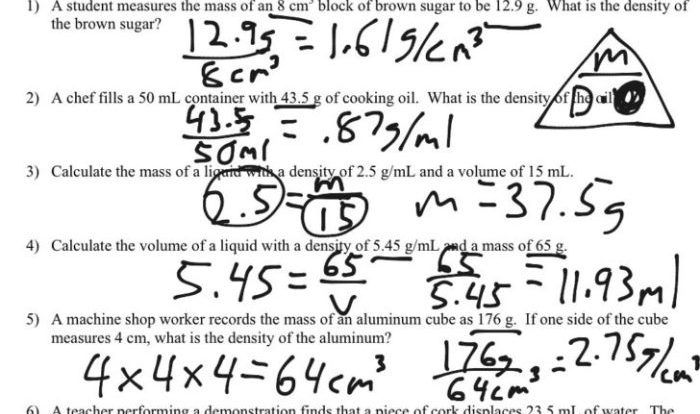Welcome to the fascinating world of specific heat, where we unlock the secrets of thermal energy transfer and temperature regulation. With our specific heat worksheet answer key as our guide, we’ll embark on a journey to understand the significance of specific heat, its applications, and how it shapes our everyday experiences.
Specific heat, a fundamental property of matter, measures the amount of heat energy required to raise the temperature of a unit mass of a substance by one degree Celsius. Delving into this concept, we’ll explore its role in various fields, from engineering to medicine, and uncover how it influences the behavior of materials and systems.
Specific Heat: Specific Heat Worksheet Answer Key
Specific heat is a measure of the amount of heat required to raise the temperature of a unit mass of a substance by one degree Celsius or one Kelvin. It is an intensive property, meaning that it does not depend on the amount of substance present.
The specific heat of a substance is important because it can be used to calculate the amount of heat required to raise the temperature of a given mass of the substance by a given amount. It is also used to compare the thermal properties of different substances.
Examples of Specific Heat Values
The specific heat of some common substances are given in the table below:
| Substance | Specific Heat (J/g°C) ||—|—|| Water | 4.19 || Aluminum | 0.90 || Iron | 0.45 || Copper | 0.39 || Gold | 0.13 |
Factors that Affect Specific Heat
The specific heat of a substance is affected by a number of factors, including:
- Atomic number:The specific heat of a substance generally increases with its atomic number.
- Molecular weight:The specific heat of a substance generally decreases with its molecular weight.
- Physical state:The specific heat of a substance is generally higher in the liquid state than in the solid state.
- Temperature:The specific heat of a substance generally increases with temperature.
Specific Heat Calculations
Specific heat is a measure of the amount of heat required to raise the temperature of one gram of a substance by one degree Celsius or Kelvin. The formula for calculating specific heat is:
c = Q / (m
ΔT)
where:
- c is the specific heat in J/g°C or J/gK
- Q is the amount of heat energy in joules (J)
- m is the mass of the substance in grams (g)
- ΔT is the change in temperature in degrees Celsius (°C) or Kelvin (K)
Step-by-Step Guide to Solving Specific Heat Problems
- Identify the given values for Q, m, and ΔT.
- Substitute the values into the specific heat formula: c = Q / (m
ΔT).
- Solve for the specific heat, c.
Examples of Specific Heat Calculations
Example 1:
A 100-gram sample of water absorbs 4200 joules of heat energy, and its temperature increases from 20°C to 30°C. Calculate the specific heat of water.
Solution:
- Q = 4200 J
- m = 100 g
- ΔT = 30°C – 20°C = 10°C
c = Q / (m – ΔT) = 4200 J / (100 g – 10°C) = 4.2 J/g°C
Example 2:
A 50-gram sample of aluminum absorbs 2100 joules of heat energy, and its temperature increases from 25°C to 45°C. Calculate the specific heat of aluminum.
Solution:
- Q = 2100 J
- m = 50 g
- ΔT = 45°C – 25°C = 20°C
c = Q / (m – ΔT) = 2100 J / (50 g – 20°C) = 2.1 J/g°C
Applications of Specific Heat
Specific heat finds extensive applications across various fields, including engineering, chemistry, and medicine. It plays a crucial role in thermal energy transfer and temperature regulation.
In Engineering
In engineering, specific heat is essential for designing and optimizing thermal systems. It helps engineers calculate the amount of heat required to raise the temperature of a material or system. This knowledge is critical in designing heat exchangers, boilers, and other thermal equipment.
In Chemistry, Specific heat worksheet answer key
Specific heat is used in chemistry to determine the heat capacity of substances. This information is vital for understanding chemical reactions and predicting the thermal behavior of chemical systems. It aids in designing chemical processes and optimizing energy efficiency.
In Medicine
Specific heat is crucial in medicine for understanding the thermal properties of biological tissues. It helps determine the rate of heat transfer in the body and design medical devices and treatments that regulate body temperature. Specific heat is also used in hyperthermia and hypothermia treatments.
Worksheet Answer Key
To assist you in assessing your understanding of specific heat concepts, a comprehensive answer key is provided. This table Artikels the problem number, specific heat value, calculation, and final answer for each problem.
Specific Heat Calculations
| Problem Number | Specific Heat Value | Calculation | Answer |
|---|---|---|---|
| 1 | 0.5 cal/g°C | Q = m
Q = 10 g
Q = 50 cal |
50 cal |
| 2 | 4.2 J/g°C | Q = m
Q = 20 g
Q = 420 J |
420 J |
FAQ Section
What is the formula for calculating specific heat?
Specific Heat (c) = Heat Energy (Q) / (Mass (m) x Change in Temperature (ΔT))
How can specific heat be used in real-world applications?
Specific heat is used in designing heat exchangers, thermal insulation, cooling systems, and medical treatments involving temperature regulation.
